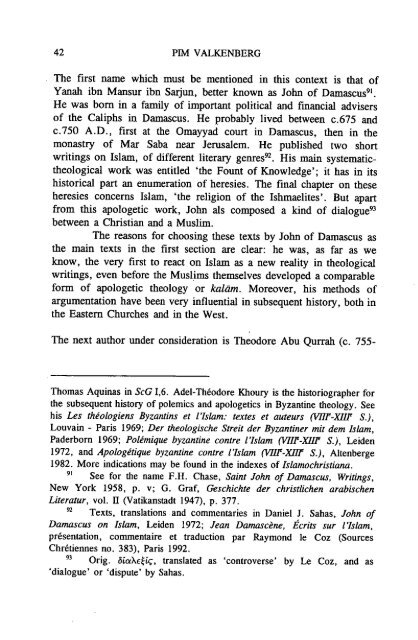Jaarboek Thomas Instituut 1997 - Thomas Instituut te Utrecht
Jaarboek Thomas Instituut 1997 - Thomas Instituut te Utrecht
Jaarboek Thomas Instituut 1997 - Thomas Instituut te Utrecht
Create successful ePaper yourself
Turn your PDF publications into a flip-book with our unique Google optimized e-Paper software.
42 PIM VALKENBERG<br />
The first name which must be mentioned in this con<strong>te</strong>xt is that of<br />
Yanah ibn Mansur ibn Sarjun, bet<strong>te</strong>r known as John of Damascus".<br />
He was born in a family of important political and financial advisers<br />
of the Caliphs in Damascus. He probably lived between c.675 and<br />
c.750 A.D., first at the Omayyad court in Damascus, then in the<br />
monastry of Mar Saba near Jerusalem. He published two short<br />
writings on Islam, of different li<strong>te</strong>rary genres". His main sys<strong>te</strong>matictheological<br />
work was entitled 'the Fount of Knowledge'; it has in its<br />
historical part an enumeration of heresies. The final chap<strong>te</strong>r on these<br />
heresies concerns Islam, 'the religion of the Ishmaeli<strong>te</strong>s'. But apart<br />
from this apologetic work, John als composed a kind of dialogue'?<br />
between a Christian and a Muslim.<br />
The reasons for choosing these <strong>te</strong>xts by John of Damascus as<br />
the main <strong>te</strong>xts in the first section are clear: he was, as far as we<br />
know, the very first to react on Islam as a new reality in theological<br />
writings, even before the Muslims themselves developed a comparable<br />
form of apologetic theology or kaläm. Moreover, his methods of<br />
argumentation have been very influential in subsequent history, both in<br />
the Eas<strong>te</strong>rn Churches and in the West.<br />
The next author under consideration is Theodore Abu Qurrah (c. 755-<br />
<strong>Thomas</strong> Aquinas in ScG 1,6. Adel-Théodore Khoury is the historiographer for<br />
the subsequent history of polemics and apologetics in Byzantine theology. See<br />
his Les théologiens Byzantins et l'Islam: <strong>te</strong>x<strong>te</strong>s et au<strong>te</strong>urs (VlIP-XlIP S.),<br />
Louvain - Paris 1969; Der theologischeStreit der Byzantinermit dem Islam,<br />
Paderborn 1969; Polémiquebyzantinecontre l'Islam (VIIP-XlIPS.), Leiden<br />
1972, and Apologétiquebyzantinecontre l'lslam (VlIP-XlIP S.), Al<strong>te</strong>nberge<br />
1982. More indications may be found in the indexes of Islamochristiana.<br />
91 See for the name F.R. Chase, Saint John of Damascus, Writings,<br />
New York 1958, p. v; G. Graf, Geschich<strong>te</strong> der christlichen arabischen<br />
Li<strong>te</strong>ratur, vol. II (Vatikanstadt 1947), p. 377.<br />
92 Texts, translations and commentaries in Daniel 1. Sahas, John of<br />
Damascus on Islam, Leiden 1972; Jean Damascène, Écrits sur l'Islam,<br />
présentation, commentaire et traduction par Raymond Ie Coz (Sources<br />
Chrétiennes no. 383), Paris 1992.<br />
93 Orig. {j[CXÀE~[Ç, transla<strong>te</strong>d as 'controverse' by Le Coz, and as<br />
'dialogue' or 'dispu<strong>te</strong>' by Sahas.








